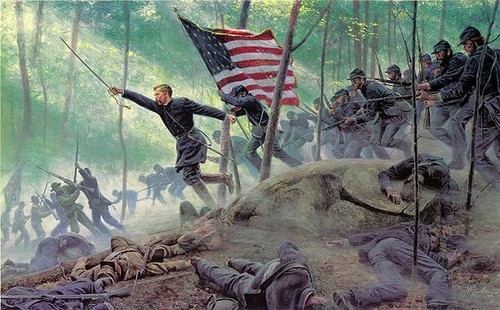
In early July 1863, the quiet town of Gettysburg, Pennsylvania, became the stage for a crucial battle in the Civil War, a conflict that would decide the fate of the United States. The Union and Confederate armies clashed in a fierce struggle, with General Lee’s troops trying to push north and General Meade’s forces determined to stop them. This battle, filled with bold strategies and brave soldiers, changed the course of the war and is remembered as a key moment in the nation’s history.
On July 2nd, the Confederate forces, led by General Robert E. Lee, sought to capitalize on their recent victories, aiming to penetrate deep into Union territory. However, the Union Army, under the leadership of General George G. Meade, was determined to halt their advance. As dawn broke, the air was thick with anticipation, the serene landscape poised to become a battleground for one of the most significant encounters between North and South.
The fighting on that day was intense and brutal, especially at Little Round Top. There, the Union’s 20th Maine regiment, led by Colonel Joshua Chamberlain, managed to hold their position against a strong attack from the Confederates. Chamberlain’s bold decision to charge downhill, driven by desperation and bravery, made a big difference, protecting the Union army’s left side. Chamberlain later said, “In great deeds, something abides. On great fields, something stays. Forms change and pass; bodies disappear, but spirits linger, to consecrate ground for the vision-place of souls.” This captures the spirit of bravery and sacrifice seen that day.
Meanwhile, the Confederate perspective was one of missed opportunities and what-ifs. General James Longstreet, Lee’s trusted advisor, harbored reservations about the attack, favoring a more defensive strategy that might have spared the South from the heavy losses incurred. His reluctance, juxtaposed with Lee’s aggressive tactics, highlighted the internal conflicts that plagued the Confederate command.
As the sun set on Gettysburg, the landscape bore witness to the sheer human cost of the conflict. The Union Army, though battered, held its ground, bolstering the North’s morale and setting the stage for future victories. The Confederate Army, despite its valor, had to face the consequences of its risky decision.
The Battle of Gettysburg, with its dramatic confrontations and strategic gambles, not only shifted the momentum of the Civil War but also underscored the complexities of leadership and the indomitable spirit of those who fought. As noted by a soldier, reflecting on the aftermath, “The war was full of stark contrasts; moments of indescribable bravery and unspeakable horrors, bound together by the shared experience of those who lived—and died—during those pivotal days.”
Leave a Reply